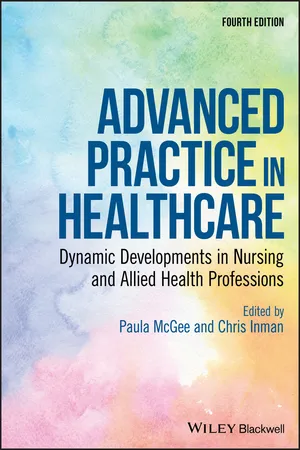
Advanced Practice in Healthcare
Dynamic Developments in Nursing and Allied Health Professions
- English
- ePUB (mobile friendly)
- Available on iOS & Android
Advanced Practice in Healthcare
Dynamic Developments in Nursing and Allied Health Professions
About this book
The definitive resource for advanced practice within nursing and the allied health professions—revised, expanded, and updated throughout.
Advanced practice is an established and continuously evolving part of healthcare workforces around the world as a level of practice beyond initial registration. Advanced practitioners are equipped to improve health, prevent disease, and provide treatment and care for patients in a diverse range of settings.
This comprehensively revised fourth edition emphasises the importance of practice in advanced healthcare, presenting a critical examination of advanced practice roles in nursing and allied health professions through a series of learning features designed to facilitate the development of vital knowledge and skills.
Advanced Practice in Healthcare presents:
- International developments in advanced practice as a global response to the need to modernise services, reduce costs and increase access to healthcare services
- Country-specific examples of advanced practitioners' roles in delivering patient care in diverse settings
- The impact of advanced practice in nursing and the allied health professions
- Controversial issues including prescribing, regulation and credentialing, and the interface with medical practice
- Ethical and legal dimensions of advanced practice
- The preparation of advanced practitioners
Advanced Practice in Healthcare is an essential resource for all students, practitioners, managers and researchers of advanced practice in healthcare.
Frequently asked questions
- Essential is ideal for learners and professionals who enjoy exploring a wide range of subjects. Access the Essential Library with 800,000+ trusted titles and best-sellers across business, personal growth, and the humanities. Includes unlimited reading time and Standard Read Aloud voice.
- Complete: Perfect for advanced learners and researchers needing full, unrestricted access. Unlock 1.4M+ books across hundreds of subjects, including academic and specialized titles. The Complete Plan also includes advanced features like Premium Read Aloud and Research Assistant.
Please note we cannot support devices running on iOS 13 and Android 7 or earlier. Learn more about using the app.
Information
PART 1
Advanced Practice as a Global Phenomenon
CHAPTER 1
The Conceptualization of Advanced Practice
Key Issues
- Concepts of “competence” and “capability”
- Critical practice
- Collaborative practice
- Factors in pioneering innovations
- Master's level preparation of advanced practitioners
LEARNING OBJECTIVES
- Explain the global context in which advanced practice has developed.
- Critically examine the concepts of “competence” and “capability” in relation to advanced practice.
- Critically discuss the concept of “critical practice” in relation to advanced practice.
1.1 Introduction
Table of contents
- Cover
- Table of Contents
- NOTE ON CONTRIBUTORS
- INTRODUCTION
- PART 1: Advanced Practice as a Global Phenomenon
- PART 2: Advanced Practice in Allied Health Professions
- PART 3: The Advanced Practitioner in Direct Patient Care
- PART 4: Developing Advanced Practitioners' Skills
- Index
- End User License Agreement